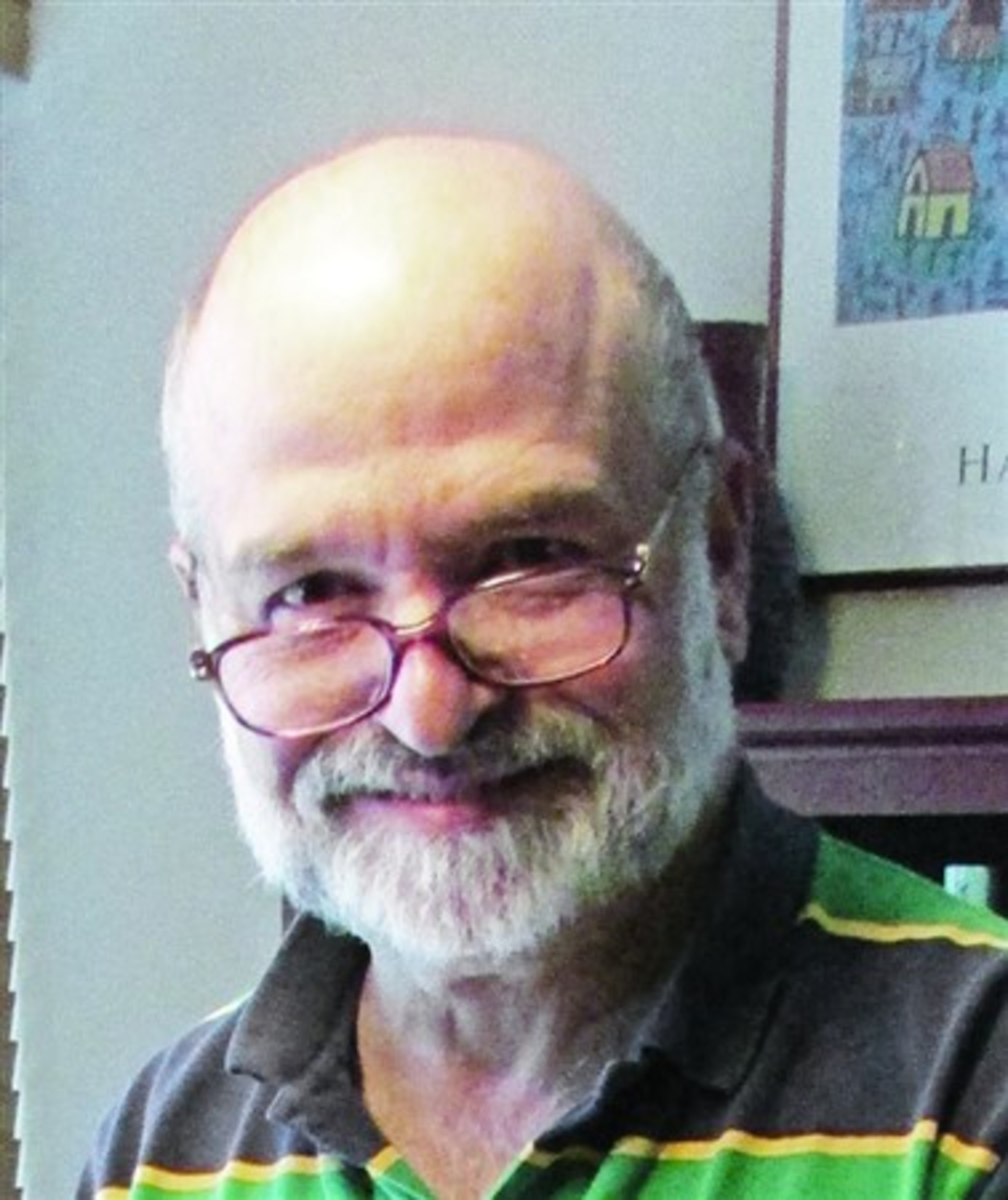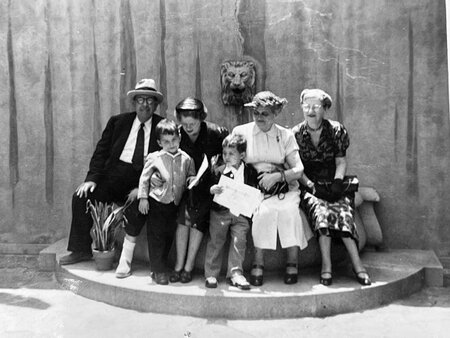Remembering Aunt Evelyn and Uncle Julius
Betty, my younger sister, recently sent me a photo of gorgeous purple irises growing behind her Los Angeles home. She reminded me that they were the progeny of bulbs planted by our great-uncle, Julius Jacoby, who died in 1966, four years after his wife, Evelyn. It suddenly occurred to me that these flowers are among the couple’s few survivors.
Born in 1892, Evelyn was four years older than her sister, Marion, my maternal grandmother. Their father, Sigmund Rheinstrom, a German immigrant who had settled in Cincinnati, became a highly successful liquor wholesaler.
The Rheinstroms belonged to Cincinnati’s oldest Jewish congregation, K. K. Bene Israel, founded in 1824, which later became known, under Reform auspices, as the Rockdale Avenue Temple. Sigmund also was a benefactor of the nearby Reform seminary, Hebrew Union College.
Both Evelyn and Marion studied Latin, French and German at the private University School. Evelyn enjoyed the distinction of graduating from Smith College in 1914. I inherited her senior yearbook and a Smith bowl, as well as her eight-volume set of novels by Louisa May Alcott.
Marion probably would have gone to Smith too, but her mother, Madeline, who had grown up in West Virginia, died at 32 years of age on a trip to Europe in 1903. Consequently, Marion stayed at home to help look after her father and supervise his servants, and became a commuter student at the University of Cincinnati.
A 1917 classmate was Jacob Rader Marcus, who became not only a legendary professor at Hebrew Union College but the founder of its American Jewish Archives. I have Marion’s senior yearbook too.
I do not know how or where they met, but Aunt Evelyn married Bertram Hirsh, a successful businessman, and moved to St. Louis, his hometown. She was widowed in 1923, at 31 years of age.
Evelyn met her second husband, Julius, in Los Angeles, his hometown. She and her widowed father, Sigmund, wintered in Southern California, but she probably returned to California to visit her sister and brother-in-law, my maternal grandparents, Marion and George Rosenthal, who temporarily retired there.
George’s sister, another Evelyn, had married Edgar Magnin, the rabbi of Los Angeles’ Wilshire Boulevard Temple from 1915 to 1984. Evelyn Rosenthal had met this charismatic San Franciscan when he studied at Hebrew Union College.
Julius, already 46, belonged to a pioneering Jewish family; his father and four uncles had established Jacoby Brothers, a chain of dry goods stores, in 1875. Decades earlier, the Jacobys had sold their business to the May Company chain, which, coincidentally, was based in St. Louis.
In 1946, after graduating from University School and attending Cornell University, my mother moved to Los Angeles when she married my father, Eugene. Having been the flower girl at Evelyn and Julius’ wedding in 1930, she soon became their de facto daughter.
Estranged for decades, there were probably only a few occasions when my Rosenthal grandparents and my Jacoby “grandparents” saw each other. One was in the fall of 1953, when my brother Theo and I were consecrated at the Wilshire Boulevard Temple. Another occasion, eight years later, was our Bar Mitzvah (held, coincidentally, on Julius’ birthday).
If the Jacobys had had children of their own, they probably would have joined the temple. Perhaps they felt that their prayers had gone unanswered.
Evelyn was quite proud of her Smith connections. Not only was she one of a very small group of Westside Jews who attended alumnae teas in Pasadena, but she served as president of the Los Angeles club during the early 1950s.
Fortunately, I was unable to think of Evelyn or Julius as snobs. During World War II, she had been a proud Red Cross volunteer. And his true nephew, Melville, an American airman, had sacrificed his life during the war.
Evelyn and Julius were deeply devoted to cultural pursuits. Quite often, after religious school, they took Theo, Betty and me to chamber music concerts, operettas, art museums and bookstores. They were especially devoted to European travel.
During the mid-1950s, for example, the Jacobys spent months at a time in Italy and France, sending scores of enthusiastic letters and postcards describing their latest discoveries. They always believed that we children would follow in their footsteps – and, inspired by many relatives, we did.
But Uncle Julius could also be quite embarrassing. Remember the John Candy movie, “Uncle Buck”? Our relative was corpulent, wore bulging suspenders and often sported a floppy fedora or a straw hat. He spoke too loudly, struck up too many conversations with strangers, teased little kids and drove a somewhat battered sedan.
Perhaps Julius’ most embarrassing trait was his green thumb – or hand. My siblings and I referred to his front and backyard gardens, nearly devoured by flowers and foliage, as “The Jungle.”
Yet, Julius’ gardening obsession was hardly a deterrent when, one night, we Goodwins fled a wildfire in our hillside neighborhood and sought refuge in the Jacoby home. Inevitably, it became just another occasion to savor French onion soup ladled from a Wedgewood tureen!
In 1962, about a year after Evelyn was diagnosed with cancer, Dad took Theo and me to see her at Cedars of Lebanon, the Jewish hospital in Hollywood where we had been born. It was our first bedside encounter with mortality. She was probably unaware of our presence, but we felt her mantle of love.
Before his demise, Julius took one more European odyssey. Upon his return, Mom, his most loyal relative and friend, helped him find and furnish a temporary home. Eventually he returned to 511 North Bedford Drive, where he resurrected “The Jungle.”
Foolishly, I dreaded the possibility that my “Uncle Buck” would attend my high school graduation. Due to an illness, however, he was unable to do so.
During my first semester of college, when Mom was making her first visit, Dad called to report that Julius had suffered a fatal heart attack. As with Evelyn’s demise, however, there would not have been enough mourners to justify a funeral, so his remains were also cremated.
Eventually, new owners demolished the Jacoby manse to erect a McMansion.
Perhaps Uncle Julius had been a poor choice for Aunt Evelyn, but to us children, who dearly loved them, they belonged to each other. Though otherwise abandoned by the world, they still belong to us. With Betty’s flowers, I offer this eulogy.
GEORGE M. GOODWIN, of Providence, is the editor of Rhode Island Jewish Historical Notes.











